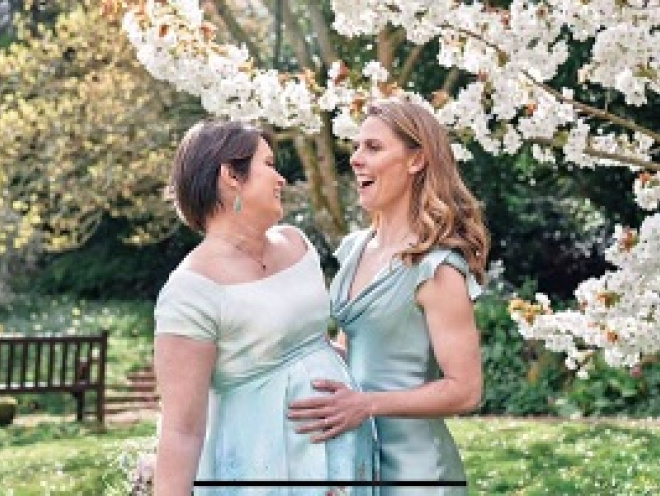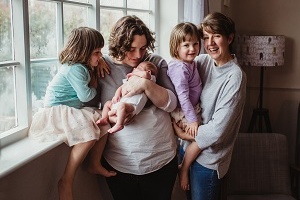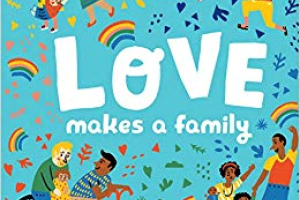Mum of three, Claire Lynch, shares her experience of being a two-mum family and offers her advice for being included during pregnancy and labour by healthcare professionals
Like lots of parents-to-be, we took our homework very seriously. From the moment the test result was positive we started reading books, downloading apps, and scouring websites trying to prepare for the adventure of parenthood. Sadly, we were often left disappointed.
Our experience overlooked
Many of the bestselling pregnancy books totally overlooked our experience. Finding support and resources that consider the specific concerns of LGBT+ parents was tricky.
Even the most well-meaning discussions of ‘alternative families’ can be built on assumptions that don’t always apply. Although I was always delighted to come across the mention of a non-bio mum, it sounded to me more like washing powder than a loving parent.
Try not to be discouraged if you see an absence of lesbian mothers represented in the books or websites you read. Of course, much of the advice is the same for all new parents and where more specific resources are needed they can be accessed online so do take some time to read around.
Some non-birthing mothers induce lactation, for example, in order to share in breastfeeding their baby. If your antenatal class doesn’t provide information on this you can find more details online.
Discrimination and feeling invisible
I won’t pretend that things have always been easy. Even as I stood by my partner’s side, holding her hand as the caesarean was about to begin, one of the doctors asked me who I was and why I was in the room.
In spite of the growing numbers of LGBT+ couples becoming parents in the UK, non-birthing mothers often report discrimination in healthcare settings. Sometimes this takes the form of misidentification. I was variously assumed to be my partner’s sister or a friend. Sometimes I was treated as invisible, the consultant or midwife simply pretended I wasn’t there.
Being sidelined like this is, of course, upsetting but it can also have a real impact on the way you and your partner are able to enjoy the pregnancy. It’s really important not to lose confidence or to avoid meaningful events like cutting the cord because you are worried about how people might treat you.
Challenge attitudes
Being upfront with preferred language can really help. Introduce yourself to the sonographer or the health visitor, set the tone so they know you expect to be included in the conversation like any other parent. Although this might seem daunting, there may be times, during labour, for example, when you need to communicate your partner’s wishes. So being clear about your role is essential.
Assumptions about LGBT+ couples might also need to be challenged for medical reasons. My children were conceived through reciprocal IVF so although I am not their birth mother I am their biological mother. Doctors often need to be reminded of this to make sure the questions they are asking about medical history are relevant.
Although it can be wearing to have to come out every time you encounter a new member of staff, it is important to be clear so that you’re not distracted from focusing on your partner and baby. If you feel able to, challenging attitudes that make you uncomfortable can give you back a sense of power. Maybe it’ll even help someone reconsider how they speak to others in the future.
Claire Lynch is a writer and academic. She lives near Windsor with her wife Bethan and their three daughters. This article is part of a series she has written about her experiences as a LGBT+ parent for NCT. Her book Small: On motherhoods, telling the story of her motherhood journey, is out now and published by Brazen_Octopus books. If you'd like to share your story, please do get in touch: nctmatterseditor@nct.org.uk
Further information
Our support line offers practical and emotional support with feeding your baby and general enquiries for parents, members and volunteers: 0300 330 0700. We also offer antenatal courses which are a great way to find out more about birth, labour and life with a new baby.
Make friends with other parents-to-be and new parents in your local area for support and friendship by seeing what NCT activities are happening nearby.
You might find attending one of our NCT New Baby groups helpful as they give you the opportunity to explore different approaches to important parenting issues with a qualified group leader and other new parents in your area.
Read the free guide from Stonewall ‘Pregnant Pause: A guide for lesbians on how to get pregnant’ covering all aspects of pregnancy and childbirth from conception to starting school
Read more about the parenting issues facing same-sex parents on the website, Pink Parents







